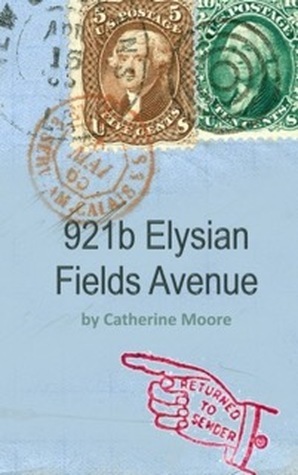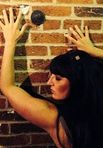Carpe Noctem Chapbook Interview With Catherine Moore
 Kentucky Story Press, 2015 THINGS WE’RE DYING TO KNOW…
Kentucky Story Press, 2015 THINGS WE’RE DYING TO KNOW…Let’s start with the book’s title and your cover image. How did you choose each?
The title, 921b Elysian Fields Avenue (RETURN TO SENDER), was created over time. As the narrative progressed I realized the character I was writing came from my past (see below) and I knew it was set in New Orleans, thus on Elysian Fields Avenue. Halfway through drafting the collection I decided the letters (poems) would remain unread. I saw them as a stack of weathered envelopes tied in twine and stamped (RETURN TO SENDER). The 921b is not homage to Sherlock Holmes but was decided after I toured Elysian Fields via Google Earth to find the location. I selected the perfect house for Daphne. As to the cover, the publisher, Ashley Parker Owens, and I had similar letter-related thoughts for the book cover so collaboration was easy and she designed it for the collection.
And, if I asked you to describe or sum up your book, what three words immediately come to mind?
Epistolary Suspense Poetry.
What were you trying to achieve with your book? Tell us about the world you were trying to create, and who lives in it.
The chapbook is epistolary, using a series of letters to tell a love story. Through the use of personas, a battle between chastity (Daphne) and sexual desires (Apollo) is recreated in a modern context.
After attending a lecture on Fernando Pessoa, I was fascinated by his use of heteronyms (variety of personas) in his private love letters. That fascination served as the inspirational framework for this collection. This love story, set in the city of New Orleans, is told by way of an obsessed young man, Paul, who writes from different heteronyms (Apollo and Vern) to his desired Daphne.
I wrote the chapbook as prose poems, always intending it to be a hybrid narrative of prose and poetics. Through the letters a classic love triangle develops, although in this case the "triangle" only really involves two people. Paul is at odds with his heteronyms for Daphne’s attention. And will Daphne ever respond? At some point the reader may even consider the possibly that there’s just one person involved in the drama. I hope the ending resolves that.
The characters are attending college in New Orleans in the late 1980’s, a time period when I lived there, and I hope 921b Elysian Fields Avenue (RETURN TO SENDER) is as quirky and unpredictable as the city itself. The settings were harvested from my memories, reliable or otherwise. The characters and their stories are fictitious.
Can you describe your writing practice or process for this collection? Do you have a favorite revision strategy?
This book originated from a 30 poems in 30 days effort. I convinced a fellow poet, Alfred Booth, to join me and we shared our daily poetry. Originally my concept was a female character writing in multiple personalities from two voices. The conceptual setting was also different.
After the second day of writing I realized (based on Alfred’s comments) that I might be writing in a male voice and that the character was from a novel I sketched out 20 years ago and never wrote. I just let it flow. Everyday starting with “Dear Daphne” and not knowing what came next. Alfred helped with suggestions “that’s not Paul’s voice, it sounds like Apollo to me.” One week into writing I sent him a message “I think there’s a third darker persona and his name is Vern.” It was unformed, free-wheeling, and fun.
When I went back to revise the series I showed another colleague of mine, Suzanne Ritcher, what I thought were a few of the best in series. She contacted me the next day: there should be more Vern, write more, what’s the backstory to this one, write more, and “send me the rest of the series.” This is very different than the way I typically work, but it was helpful to have readers check variation in voice. As I revised, Apollo became more lyrical and Vern the nearest to prose. Some letters seem more prose-like but are really poetry forms in disguise, such as Vern’s obsessive Valentine's note that is a villanelle.
How did you order the poems in the collection? Do you have a specific method for arranging your poems?
They are definitely not ordered in 921b Elysian Fields Avenue (RETURN TO SENDER) in the order I wrote them. Since I produced a new letter poem each day without pre-deciding on which voice, I often wrote in a blue streak of Apollo’s or Paul’s. It was after rounds of revision that I looked at sequencing. I laid out printed copies on the floor and read them in different orders. When I felt the narrative was correctly threaded, I made more edits for continuity of seasons and time progression. Then I thought each persona (heteronym) would date and use salutation in the letters differently, which really was the final step.
What do you love to find in a poem you read, or love to craft into a poem you’re writing?
The unexpected. Not just a volta or a twist, but a word that takes me to the dictionary, a moment or character that is unique, or fresh imagery and language that makes me read it in repeat.
Can you share an excerpt from your book? And tell us why you chose this poem for us to read – did it galvanize the writing of the rest of the collection? Is it your book’s heart? Is it the first or last poem you wrote for the book?
The heart of book is obsession. The obsessive love of another. Obsessive internal dialogues. A desire to control obsessions. A need to explain all these obsessions to the one you love; from a letter of Apollo to Daphne--
You ask, this ruminative, how is this bodily felt? Crammed with life dust gathered under nails or born large and looming in the hip's gape? Within arms stretched reaching to hold nothing, or inside chambers waiting to yield everything? Resting sandhya between each passing hale, rising in rings above a collarbone hollow, or hidden inside coils under the helix after floating in a tear duct pool? I don't know its dwelling but it is fluent, in the providential retreat of swallow, in the fortune of oscillating membranes.
If you had to convince someone walking by you in the park to read your book right then and there, what would you say?
Have you ever loved someone who didn’t even care if you existed? Someone who would leave your heart-wrenched love poems unopened? Sadly, this may be your kind of read.
Are there other types of writing (dictionaries, romance novels, comics, science textbooks, etc.) that help you to write poetry?
What do Betty Boop, the blessed Virgin, Elizabeth Taylor, voo-doo dolls, Greek gods, 1950’s greasers, pilgrims, the band General Public, and Charon have in common? They all make a brief appearance within this collection. I am very eclectic in what I read and how I find inspiration. Along those lines, I like writing that combines the commonplace and the unusual.
What are you working on now?
I am working on (more) collections in hybrid forms— another chapbook, “One February,” that is a long narrative poem written in Ginsberg American Sentences and newer verse with Southern Gothic under tones. I’d say for now, I’m into longer thematic works that span a bridge between poetry and prose.
What book are you reading that we should also be reading?
I recommend that writers submit work to literary contests that offer books in return for fees. This is how I discover gems like Tender the Maker by Christina Hutchins. I adore the way her poetry is rich in unobvious detail, such as how strangely green the grasses are at Auschwitz.
Without stopping to think, write a list of five poets whose work you would tattoo on your body, or at least write in permanent marker on your clothing, to take with you at all times.
Elizabeth Bishop, Lucille Clifton, Mark Strand, Barbara Hamby, and Kay Ryan. Wait, Dorianne Laux and Tony Hoagland. Wait…
What’s a question you wish I asked? (And how would you answer it?)
We know the poems are written in persona, so the “I” in the poems is not you the writer, but since you shared that you lived in New Orleans in this time period-- which one of these poems reflects yourself?
When I read the collection now, I think the letter poems of the Fourteenth of October 1987 and Feb. 9, 1988 most accurately reflect my feelings when delving into my memories of New Orleans. Both contain the bittersweet, that crazy passion of I hate this world and I love this world.
***
Purchase 921b Elysian Fields Avenue (RETURN TO SENDER) from Kentucky Story Press.
 Catherine Moore is the author of Story (Finishing Line Press), 921b Elysian Fields Avenue (Return to Sender) (KYStory, 2015), and Wetlands (dancing girl press, 2016). Her writing appears in Tahoma Literary Review, Cider Press Review, Bluefifth Review and in various anthologies. She won the Southeast Review’s 2014 Gearhart Poetry Prize and had work included in The Best Small Fictions of 2015. Catherine lives in the Nashville area where she enjoys a thriving writer’s community and was awarded a MetroArts grant. Catherine earned a Master of Fine Arts from the University of Tampa. Visit her online at http://about.me/catherinemoore and at Goodreads.
Catherine Moore is the author of Story (Finishing Line Press), 921b Elysian Fields Avenue (Return to Sender) (KYStory, 2015), and Wetlands (dancing girl press, 2016). Her writing appears in Tahoma Literary Review, Cider Press Review, Bluefifth Review and in various anthologies. She won the Southeast Review’s 2014 Gearhart Poetry Prize and had work included in The Best Small Fictions of 2015. Catherine lives in the Nashville area where she enjoys a thriving writer’s community and was awarded a MetroArts grant. Catherine earned a Master of Fine Arts from the University of Tampa. Visit her online at http://about.me/catherinemoore and at Goodreads.
Published on March 08, 2016 04:20
No comments have been added yet.



